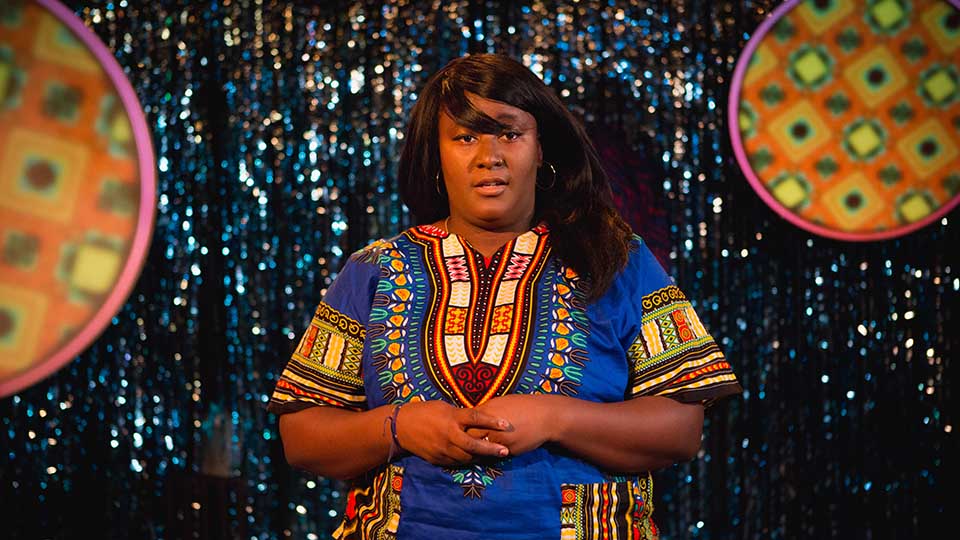Age, angst and expectation: Yolanda Mercy’s Quarter Life Crisis
Ever get the feeling life just isn’t going your way? You know: friends taking work in their stride, posting holiday pics, starting a family, and generally appearing to live life large.
You, meanwhile, are still struggling to get by – and reality bites.
Yolanda Mercy’s Quarter Life Crisis is a stage play about precisely this feeling.
“My friend was having a baby, my cousin was getting married, and I was trying to find ways to cheat the system and keep my Young Persons Railcard,” the actor and playwright tells Fringe Frequency, when asked where the idea for this play came from. “As a result of this, I turned to my laptop and started to pen my fears of growing up by writing Quarter Life Crisis.”
Written and performed by Mercy, and directed by Jade Lewis, the play explores age angst and generational expectations through the eyes of Nigerian Londoner, Alicia.
The play was recently selected out hundreds of applicants to receive funding from Underbelly. This funding is going towards helping Mercy and her company perform the play at the renowned Edinburgh Festival Fringe this August.
In order to raise the rest of the money they need to perform at the Edinburgh festival, Mercy and Lewis have started a crowdfunding campaign. But more on that later.
“I always try to write from an honest place, which makes it so humbling when an audience says, ‘that’s my story on stage’” – Yolanda Mercy
WHAT’S IN THE SHOW?
“This show is all about having a good time,” says Lewis, when asked what audiences can expect from it.
“You can expect to have a laugh, hear some good rhythms and be a part of the theatre storytelling experience. What I love to create in theatre is a post-show dialogue, and I feel Quarter Life Crisis leaves an audience thinking as well as wanting to talk about what they have just experienced.”
As well as reflecting the mood many young people in Britain feel, that their future is less certain than their parents’ when they were the same age, the play explores identity for young black Brits living in diaspora.

“I am second-generation Nigerian,” Mercy explains. “Whenever I say that I feel teary, it’s because it reminds me of the struggle my ancestors must have gone through to move here in the ’60s.
“So, whenever I do my plays, especially Quarter Life Crisis, I dedicate it to them. ’Cause without their strength, I wouldn’t be here making work. Which is why I value the stories we tell, and understand the huge responsibility I have when creating my shows.”
Lewis adds that today’s social media-obsessed world, where everyone wants to share their lives with everyone else, puts strain on many of us that we don’t discuss.
“It can lead us to really question our lives and the decisions we have made,” she says. “Also, many people, family and friends, can expect a lot from you and when things don’t go to their plan. You can be left feeling low, underappreciated and having to prove yourself. These ideas of having to please others can be our downfall, and I think it takes a lot of courage and self-love to rise above that.”
WHY DO THEY NEED MY SUPPORT?
Mercy, Lewis and their London-based creative team have been supported by Arts Council England to get Quarter Life Crisis to the place it is now. But Lewis explains that taking the show to Edinburgh during festival time is a steep cost, even with the funding they currently have.
“Due to Quarter Life Crisis going to Edinburgh this means that there are some funding pools that we do not have access to. This is why we have turned to crowdfunding,” Lewis says.
“We also feel that it is a positive way to seek funds because we are able to interact with our communities, networks and also to bear living testimony to where there is a will, there is a way, which we hope inspirers others. We have also contacted organisations and companies to seek support for sponsorships and discounts.”
Lewis and Mercy have put together a funding page, and comprehensive breakdown of what their £4,000 funding goal will be used for. Their campaign ends on June 28, and at the time of publishing, they’ve raised £585.
Depending on how things go this summer, they say they are hoping to put together an autumn or spring tour for the show.

ENOUGH TALK. WILL THIS HELP ME SOLVE MY QUARTER LIFE CRISIS?
Look, even if we did know the answer to that, we couldn’t tell you.
What we can say though is that early responses to the show have been very positive, and audiences who have seen the company’s work, including their previous production, On the Edge of Me, have said it had a lasting impact on them.
Reflecting on her journey so far, Lewis says: “I love directing and creating new work, and doing this play has enabled me to do that. I feel free, creative and challenged in the rehearsal process, which has led me to really appreciate my job and my journey as an adult.”
Mercy says: “I always try to write from an honest place, which makes it so humbling when an audience says, ‘that’s my story on stage’. I love when I hear that, ’cause it means we are making strong, relevant and meaningful work.”
Find out more about Quarter Life Crisis, and how you can donate to the company’s Edinburgh Fringe fund, on their crowdfunding page.
You can find out more about Yolanda Mercy and Jade Lewis on their personal sites.
Image: Rebecca Pitt and Other Richards (main, body image #1); Helen Murray (body image #2). All images are copyright of their respective parties.

